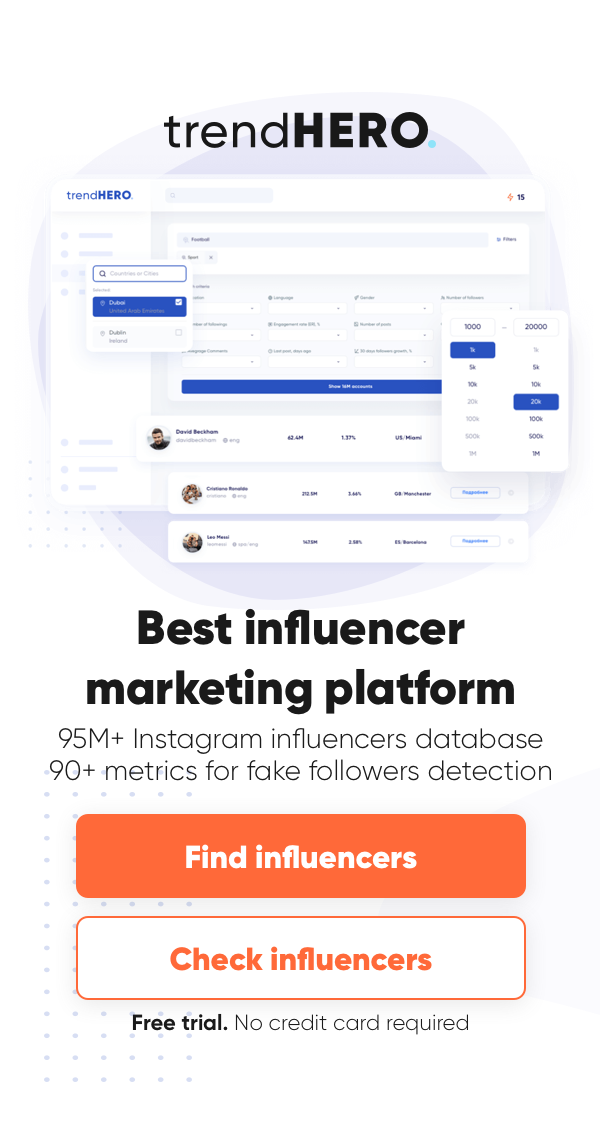- Home
- BLOG
- Instagram Marketing
- A Brand’s Guide to Influencer Affiliate Marketing
Influencer affiliate marketing is one of the most powerful tools that brands can use to increase their reach and visibility. It involves partnering with influencers with an engaged audience to promote your products or services. This type of marketing helps you tap into a larger pool of potential customers and establishes trust between you and your target market.
However, brands need to understand how influencer affiliate marketing works before they dive in. By taking the time to set up a successful program from the outset, brands can ensure that their efforts pay off – both now and in the long run.
In this blog post, we’ll explore influencer affiliate marketing, how it works, and why it benefits businesses looking to grow their customer base. We’ll also look at some essential steps brands should take when starting this marketing strategy and things they should watch out for.
What is influencer affiliate marketing?
In simple terms, influencer affiliate marketing is a type of marketing in which a brand collaborates with an influencer to promote its products or services, and the influencer then earns a commission for each sale made through their unique affiliate link.
It’s a win-win situation for both the brand and the influencer.
The brand gets exposure to the influencer’s audience and potential buyers, while the influencer earns a commission for driving sales. What sets influencer affiliate marketing apart from traditional advertising is the personal touch that influencers bring to the promotions. They provide a genuine recommendation or endorsement of a product/service based on their experience, which makes it more likely for their followers to trust and purchase the product.
In the following sections, we’ll dive deeper into the various aspects of influencer affiliate marketing, including the benefits, types of partnerships, and best practices for brands and influencers. Let’s get started.
What is the difference between influencer marketing and affiliate marketing
Long story short:
- Influencer marketing = collaborating with influencers.
- Affiliate marketing = creating affiliate links everyone can promote and get commission for desired actions.
These types of marketing have their own strategies, tools, tip, etc. For instance, in the case of influencers, you usually make a personal offer to the influencer with an email pitch or direct message, pay upfront, and approve content. In case of affiliates you usually create a public offer, place it on different platforms, pay commission, and moderate affiliates and traffic.
Can influencers be affiliates? You can combine these two strategies.
So you’ll have collaborating with influencers using affiliate links and paying commissions. Like this:
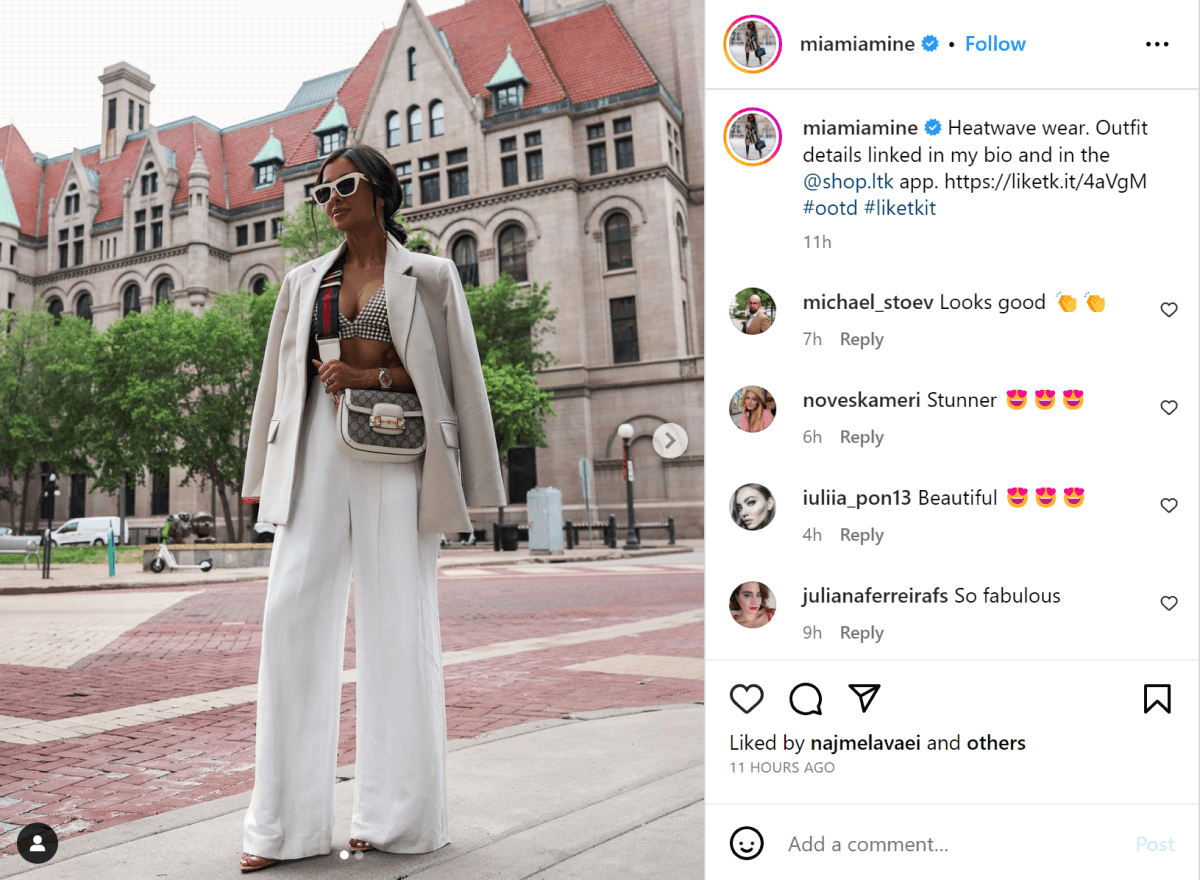
Here you can see an influencer providing a link for all the staff she is wearing. If someone buy something, this influencer will get a commission.
Some creators don’t like an ‘affiliate scheme’, because they can’t influence the sales. It’s more convenient to get paid for content and potential reach than rely on sales on partners’ sites. But other influencers (e.g. fashion microinfluencers) loves this approach, because it simplify their work.
Benefits of Influencer Affiliate Marketing
If you’re a brand looking to reach new audiences and increase your sales, influencer affiliate marketing might be your perfect strategy. Here are some benefits you can expect when you embark on this path.
Greater Brand Awareness
One of the most significant advantages of partnering with influencers is the massive reach they can bring. These social media stars have built up audiences of thousands or even millions of followers who trust them and look to them for recommendations.
By working with influencers who align with your brand’s values and aesthetics, you can quickly introduce your product or service to a wide new audience who may never have heard of you. And because these endorsements come from someone the audience already knows and likes, they’re more likely to trust and act on them. That’s the power of brand awareness.
Increased Sales
The ultimate goal of any marketing campaign is to boost revenue, and influencer affiliate marketing is specifically designed to do just that.
Through affiliate partnerships, influencers earn a commission on every sale they drive to your website.
This incentivizes them to promote your product organically and authentically on their channels without coming across as pushy or sales. And because the commission structure is performance-based, you only pay for results.
One brand that has seen great success with influencer affiliate marketing is Glossier. The beauty company has famously relied on user-generated content and influencer partnerships to build a cult following and drive sales. However, by partnering with influencers who already love their products, Glossier can leverage their authentic enthusiasm to drive clicks and conversions.
Here is an examples of collaboration with influencers:
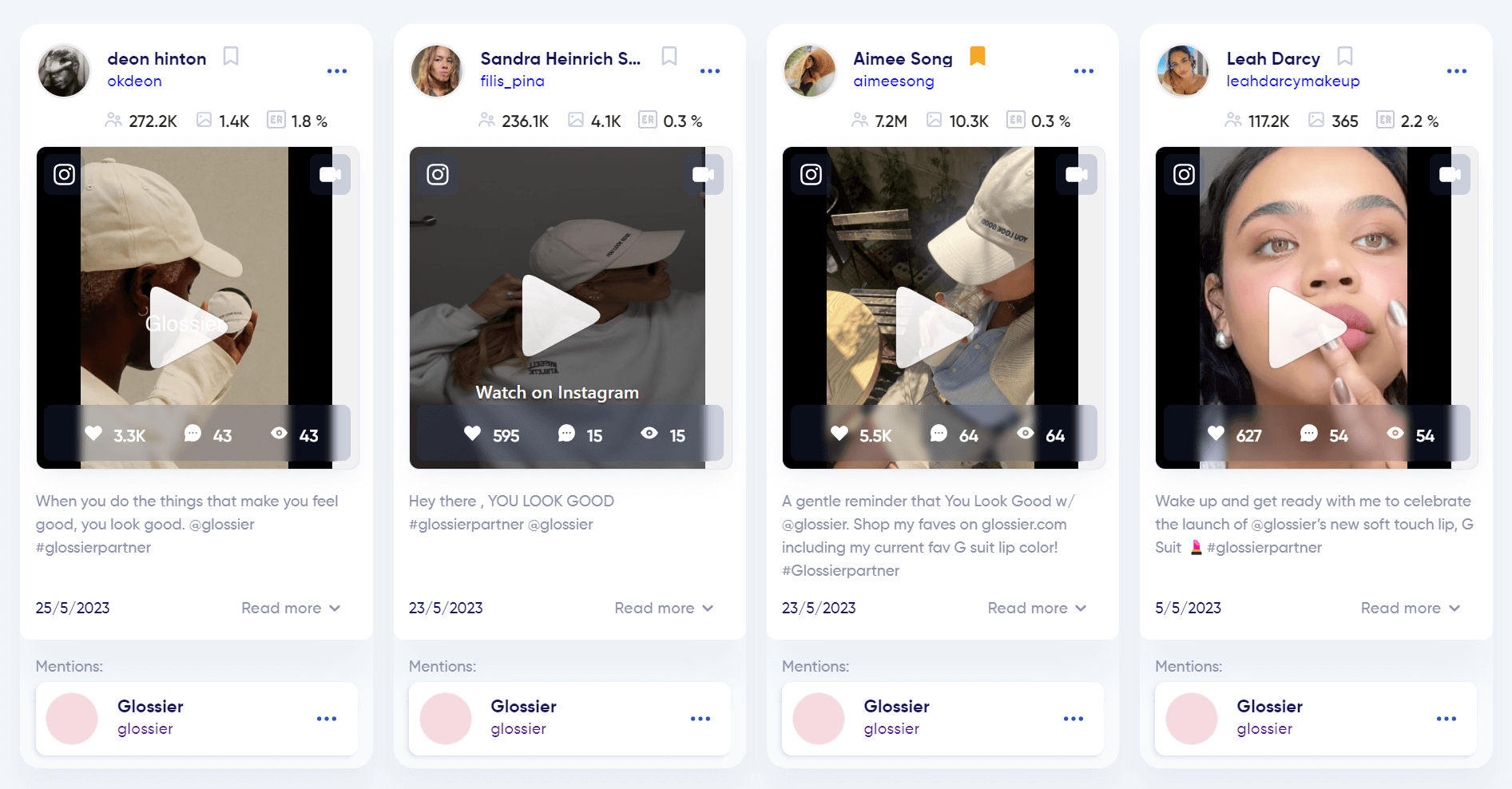
And here is an example of promo code (probably afffiliate):
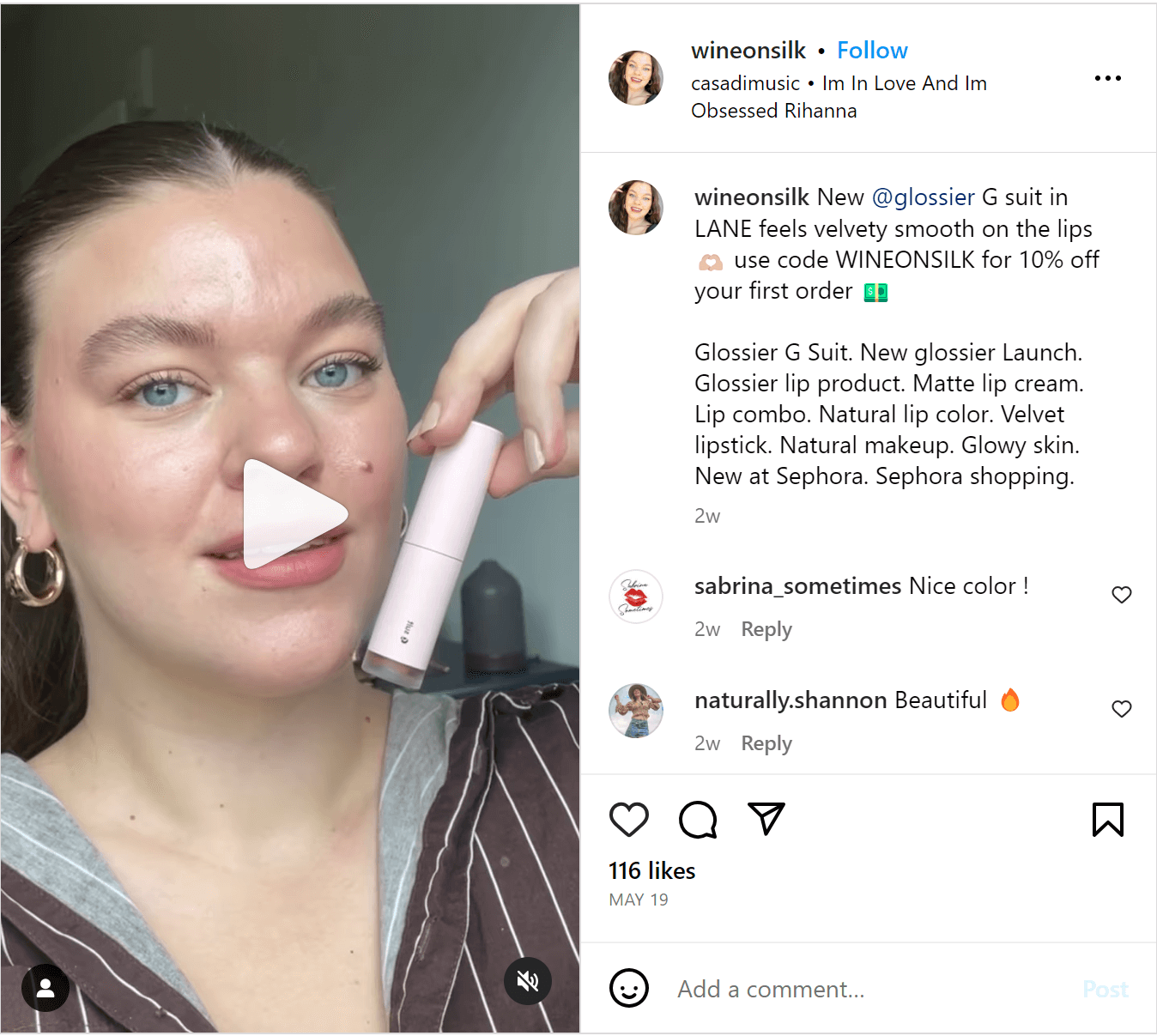
Stronger Customer Relationships
Influencer marketing is often compared to influence as social proof, but it can also be a tool for building deeper connections with your existing customers. By working with influencers representing your brand values and mission, you’re telling your audience that you care more than just making money. You’re building a community of like-minded individuals with similar interests and values.
For instance, home decor company West Elm frequently partners with influencers who share their passion for sustainability, ethical production, and good design. By showcasing real homes and people who use their products, West Elm can create an aspirational lifestyle brand that resonates with its target audience.
Overall, the benefit of influencer affiliate marketing is hard to ignore. With the right partners and a clear strategy, this can be a powerful way to reach new audiences, drive sales, and build a stronger brand identity.
Steps for Brands to Take When Setting Up an Influence Affiliate Program
Now that you better understand the benefits of influencer affiliate marketing, it’s time to look at the most critical steps to setting up your influencer affiliate program.
Finding the Right Influencers
The success of your influencer affiliate program largely depends on the influencers you choose to work with. It’s not just about their follower count – you also need to consider their niche, engagement rate, and brand alignment.
How do I find affiliate marketing influencers?
First, identify the types of influencers who align with your brand.
For example, do you sell beauty products? Look for makeup artists, skincare enthusiasts, and beauty bloggers. Are you in the outdoor gear industry? Seek out hikers, backpackers, and adventure junkies.
Use influencer search tool to get a list of potential influencers:
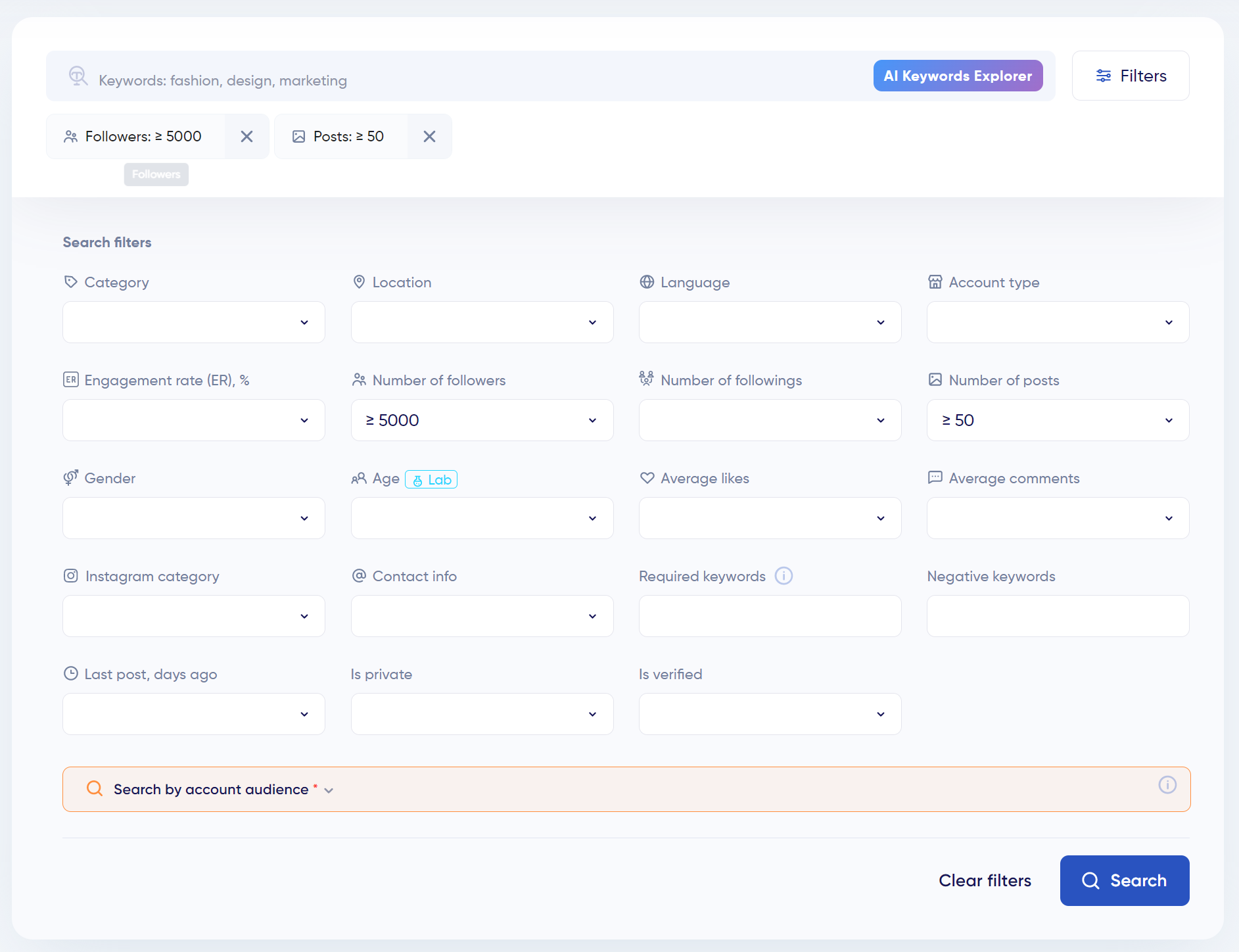
How can you determine if an influencer’s audience aligns with your niche?
Once you’ve narrowed down your list, research their engagement rate. This measures how many of their followers actively engage with their content through likes, comments, and shares. You want to work with influencers with a high engagement rate, which indicates a stronger connection with their followers and a higher likelihood of driving conversions.
Lastly, ensure the influencers you choose share your brand values and messaging. They should be authentic and passionate about helping you with your product launch plan, not just in it for the money.
Creating Engaging Content and Offers
Once you’ve partnered with your chosen influencers, it’s time to create content and offers that will entice their followers to purchase.
This doesn’t mean bombarding them with ads – it means creating valuable and relevant content that aligns with your brand and resonates with their audience.
For example, if you sell eco-friendly clothing, partner with sustainable fashion bloggers to create posts about the importance of ethical fashion and how your products fit into that narrative. Or, if you sell healthy snacks, team up with fitness influencers to create recipes that incorporate your snacks as part of a healthy diet.In terms of offers, consider providing exclusive discount codes or giveaways for their followers.
This incentivizes them to make a purchase and encourages them to become repeat customers.
Tracking Performance and Measuring Results
Lastly, it’s essential to measure the success of your influencer affiliate program.
This means tracking the performance of each influencer, as well as the overall impact on your business.
Ensure you have a system to track (generated by each influencer):
- clicks,
- conversions,
- revenue.
This will help you identify which influencers drive the most sales so you can refine your strategy accordingly.
You should also monitor your overall ROI (Return on Investment).
For example, calculate the amount you spend on influencer commissions compared to the revenue generated from those sales. This will show you whether your program is profitable and if you need to adjust your commission rates.
According to Anthony Martin, Founder and CEO of Choice Mutual, “With the right influencers, brands can experience a return on investment that is much higher than what they would get from traditional marketing methods. Measuring performance and ROI are key to making sure the program is successful.”
What are some examples of different niches to include in an influencer affiliate program?
Influencer affiliate programs can be effective across a wide range of niches. Here are some examples:
- Fashion and Apparel: This is one of the most popular niches for influencer affiliate marketing. Influencers in this niche can showcase clothing and accessories in their posts, and provide affiliate links for their followers to purchase the items.
- Beauty and Skincare: Beauty influencers often review products, create makeup tutorials, and share skincare routines, providing ample opportunities to include affiliate links to the products they’re using.
- Fitness and Health: Fitness influencers can promote everything from workout equipment and clothing to supplements and health foods. They can also provide affiliate links to fitness programs or online training courses.
- Tech and Gadgets: Tech influencers can review the latest gadgets, software, and apps, and provide affiliate links for their followers to purchase the products they recommend.
- Travel: Travel influencers can promote a wide range of products and services, including hotels, flights, travel gear, and travel insurance. They can also earn commissions from travel booking sites through affiliate links.
- Food and Cooking: Influencers in this niche can promote cooking utensils, recipe books, food delivery services, and even specific food brands. They can share recipes that use the products they’re promoting and provide affiliate links for their followers to purchase them.
- Parenting and Kids: Parenting influencers can promote a wide range of products, from baby gear and children’s clothing to educational toys and books. They can also promote services like online tutoring or kids’ subscription boxes.
- Home Decor and DIY: These influencers can promote furniture, home decor items, DIY tools, and more. They can also provide affiliate links to online stores where their followers can buy the products they recommend.
- Finance and Investing: Influencers in this niche can promote financial tools, investment platforms, online courses, and books about finance and investing.
- Sustainability and Eco-friendly Living: Influencers in this niche can promote eco-friendly products, from reusable shopping bags and water bottles to organic food brands and green cleaning products.
Remember, the key to a successful influencer affiliate program is finding influencers whose values align with your brand and whose followers match your target audience.
Things to Watch Out For in Influence Affiliate Marketing
Starting an influencer affiliate marketing program can be a great way to boost your brand’s visibility and sales, but it’s essential to be aware of potential pitfalls. Here are some things to watch out for.
Choosing the Wrong Influencers
When selecting influencers to promote your brand, it’s crucial to do your research. Don’t just go for the most prominent names with the most followers.
Instead, ensure they align with your values, have an engaged audience that matches your target market, and aren’t known for controversial behavior.
According to Linda Shaffer, Chief People Operations Officer at Checkr, “Doing simple checks on potential influencers can help you avoid making a huge mistake. Take the time to research their backgrounds and their social media posts to make sure they’re the right fit for your brand.”
- Legal Compliance: Influencer marketing is subject to advertising and consumer protection laws, such as the Federal Trade Commission’s guidelines for disclosing sponsored content. Make sure your influencers are aware of these rules and follow them. Failure to comply could result in fines or damage your brand’s reputation.
For instance, skincare company Sunday Riley was accused of posting fake reviews on Sephora’s website. - Calculating Commissions: Deciding how much to pay influencers for each sale generated can be tricky. It’s essential to ensure the commission rate is fair to both parties and reflects the value of the influencer’s contribution.
Remember that commission rates can vary depending on the product or service being promoted and the influencer’s level of influence.
For instance, a micro-influencer with an engaged audience in a niche market might be more effective than a celebrity with millions of followers. - Tracking and Analysis: To measure the success of your influencer affiliate marketing program, you need to track and analyze the performance of each influencer and adjust your strategies accordingly. Use tools like Google Analytics to monitor traffic and sales generated by each influencer’s unique referral link. This will help you determine which influencers drive the most conversions and which marketing tactics work best for your brand.
What influencers should know about affiliate marketing
- How is influencer marketing paid? Influencer collaborations is usually paid forward: money, goods, or services. But in case of influencer affiliate marketing you get paid a commission after someone made a desired action: click, filled lead form, buy something.
- How do influencers get paid from links? Usually it’s IT solution. Special software generates a link for you. If someone click on this link this software track all their actions on site. Commission is added to yuor balance automatically. After that you usually need to ask for payout.
- How to start affiliate marketing with no money? You don’t need money to perform influencer affiliate marketing. You need engaged audience to click and buy from your links. If you have these followers affiliate can be an additional way to monetize your account.
For example, marketing opinion leader makes ‘Top 5 CRM platforms for small business”. It’s like 5 stories with quick reviews, ratings, and affiliate links. It means that if a follower click on any link, sign up, and buy subscription, this influencer will get a commision. All you need to do is sign up for these CRM affiliate programmes and create stories. - Can you become a millionaire from affiliate marketing? Maybe. It depends on your followings, goods you promote, and commision rate.
For example, you place an affiliate link to a tshirt you wear. It cost 10$, you have 10% commision. It means that you’ll get $1 from every order. You need to ‘sell’ 1 000 000 tshirts in this case.
You need to understand that affiiliate marketing is a long-term project. That’s why it’s usually about SEO, when you can create evergreen articles or pages to generate traffic. In case of Instagram it’s hard to get this accumulative effect.
Final Thoughts on Influence Affiliate Marketing for Brands
In conclusion, influencer affiliate marketing can be a powerful tool for brands looking to engage with their target audience and increase sales.
However, it’s essential to research when selecting the right influencers for your program – look at their engagement rate, niche, and alignment with your brand values.
You should also create engaging content that resonates with followers while providing incentives like exclusive discounts or giveaways. Finally, use tracking tools to measure the performance of each influencer and adjust strategies accordingly to maximize ROI from your influence affiliate marketing program. With these tips in mind, you’ll have everything you need to get started on building an effective influence affiliate marketing strategy.
We also recommend to read
 How to Check if Someone Bought Instagram Followers
How to Check if Someone Bought Instagram Followers  What is Brand Advertising and How to Use it
What is Brand Advertising and How to Use it  Best Instagram Tools Every Business Should Use in 2023
Best Instagram Tools Every Business Should Use in 2023  How to Connect With Influencers on Instagram
How to Connect With Influencers on Instagram  How to Get Influencers to Share Your Content
How to Get Influencers to Share Your Content  How to Create An Influencer Outreach Strategy in 7 Easy Steps
How to Create An Influencer Outreach Strategy in 7 Easy StepsInstagram Engagement Rate Calculator For Free
Check any influencer's Engagement rate and analyze his or her followers growth history
Other free tools: Follower Count History, Instagram Follower Count, CPM Calculator
